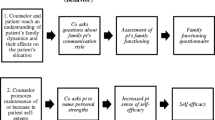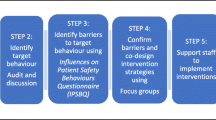Abstract
This paper describes the use of action research in a patient conference to provide updated hereditary cancer information, explore patient and family member needs and experiences related to genetic cancer risk assessment (GCRA), elicit feedback on how to improve the GCRA process, and inform future research efforts. Invitees completed GCRA at City of Hope or collaborating facilities and had a BRCA mutation or a strong personal or family history of breast cancer. Action research activities were facilitated by surveys, round table discussions, and reflection time to engage participants, faculty, and researchers in multiple cycles of reciprocal feedback. The multimodal action research design effectively engaged conference participants to share their experiences, needs, and ideas for improvements to the GCRA process. Participants indicated that they highly valued the information and resources provided and desired similar future conferences. The use of action research in a patient conference is an innovative and effective approach to provide health education, elicit experiences, identify and help address needs of high-risk patients and their family members, and generate research hypotheses. Insights gained yielded valuable feedback to inform clinical care, future health services research, and continuing medical education activities. These methods may also be effective in other practice settings.

Similar content being viewed by others
References
Weitzel JN (1999) Genetic cancer risk assessment: putting it all together. Cancer 86(11):2483–2492
Trepanier A, Ahrens M, McKinnon W et al (2004) Genetic cancer risk assessment and counseling: recommendations of the National Society of Genetic Counselors. J Genet Couns 13(2):83–114
Palomares MR, Paz IB, Weitzel JN (2005) Genetic cancer risk assessment in the newly diagnosed breast cancer patient is useful and possible in practice. J Clin Oncol 23(13):3165–3166, author reply 3166–3167
MacDonald DJ, Blazer KR, Weitzel JN (2010) Extending comprehensive cancer center expertise in clinical cancer genetics and genomics to diverse communities: the power of partnership. J Natl Compr Cancer Netw 8(5):615–624
Braithwaite D, Emery J, Walter F et al (2006) Psychological impact of genetic counseling for familial cancer: a systematic review and meta-analysis. Fam Cancer 5(1):61–75
Weitzel JN, McCaffrey SM, Nedelcu R et al (2003) Effect of genetic cancer risk assessment on surgical decisions at breast cancer diagnosis. Arch Surg 138(12):1323–1329
Lerman C, Croyle RT, Tercyak KP et al (2002) Genetic testing: psychological aspects and implications. J Consult Clin Psychol 70(3):784–797
Phelps C, Wood F, Bennett P et al (2007) Knowledge and expectations of women undergoing cancer genetic risk assessment: a qualitative analysis of free-text questionnaire comments. J Genet Couns 16(4):505–514
Metcalfe A, Werrett J, Burgess L et al (2009) Cancer genetic predisposition: information needs of patients irrespective of risk level. Fam Cancer 8(4):403–412
Vadaparampil ST, Quinn GP, Brzosowicz J et al (2008) Experiences of genetic counseling for BRCA1/2 among recently diagnosed breast cancer patients: a qualitative inquiry. J Psychosoc Oncol 26(4):33–52
Crotser CB, Boehmke M (2009) Survivorship considerations in adults with hereditary breast and ovarian cancer syndrome: state of the science. J Cancer Surviv 3(1):21–42
MacDonald DJ, Sarna L, Weitzel JN et al (2010) Women’s perceptions of the personal and family impact of genetic cancer risk assessment: focus group findings. J Genet Couns 19(2):148–160
Metcalfe KA, Liede A, Hoodfar E et al (2000) An evaluation of needs of female BRCA1 and BRCA2 carriers undergoing genetic counselling. J Med Genet 37(11):866–874
Metcalfe KA, Liede A, Trinkaus M et al (2002) Evaluation of the needs of spouses of female carriers of mutations in BRCA1 and BRCA2. Clin Genet 62(6):464–469
Di Prospero LS, Seminsky M, Honeyford J et al (2001) Psychosocial issues following a positive result of genetic testing for BRCA1 and BRCA2 mutations: findings from a focus group and a needs-assessment survey. Can Med Assoc J 164(7):1005–1009
Werner-Lin A (2008) Formal and informal support needs of young women with BRCA mutations. J Psychosoc Oncol 26(4):111–133
Habrat D, MacDonald DJ, Lagos V et al (2008) Assessing patients’ perceptions of genetic cancer risk assessment and post counseling needs. Paper presented at the City of Hope Eugene and Ruth Roberts Summer Student Academy, Duarte, CA, 2008
Thewes B, Meiser B, Tucker M et al (2003) The unmet information and support needs of women with a family history of breast cancer: a descriptive study. J Genet Couns 12(1):61–67
Hamann HA, Croyle RT, Smith KR et al (2000) Interest in a support group among individuals tested for a BRCA1 gene mutation. J Psychosoc Oncol 18(4):15–37
Dorval M, Maunsell E, Dugas MJ et al (2001) Support groups for people carrying a BRCA mutation. Can Med Assoc J 165(6):740–742
Bright Pink (2009) Available at: http://www.bebrightpink.org/. Accessed February 3 2010
FORCE: Facing Our Risk of Cancer Empowered, Inc. (2009) Available at: http://www.facingourrisk.org/. Accessed February 3, 2010
Sagor R (2000) Guiding school improvement with action research. Vol 100047. Association for Supervision and Curriculum Development, Alexandria
Frost P (2002) Principles of the action research cycle. In: Ritchie R, Pollard A, Frost P (eds) Action research: a guide for teachers—burning issues in primary education. National Primary Trust, Birmingham, pp 24–32
Meyer J (2000) Using qualitative methods in health related action research. Br Med J 320(7228):178–181
McNiff J, Whitehead J (2006) Ch 4: where did action research come from? In: All you need to know about action research. SAGE, London, Thousand Oaks, Calif., pp 36–42
Mander R, Cheung NF, Wang X et al (2009) Beginning an action research project to investigate the feasibility of a midwife-led normal birthing unit in China. J Clin Nurs 19:517–526
Spetz A, Henriksson R, Salander P (2008) A specialist nurse as a resource for family members to patients with brain tumors: an action research study. Cancer Nurs 31:E18–E26
Gresty K, Skirton H, Evenden A (2007) Addressing the issue of e-learning and online genetics for health professionals. Nurs Health Sci 9(1):14–22
Morrison B, Lilford R (2001) How can action research apply to health services? Qual Health Res 11(4):436–449
Wong DK, Chow SF (2006) Beyond clinical trials and narratives: a participatory action research with cancer patient self-help groups. Patient Educ Couns 60(2):201–205
McKinnon W, Naud S, Ashikaga T et al (2007) Results of an intervention for individuals and families with BRCA mutations: a model for providing medical updates and psychosocial support following genetic testing. J Genet Couns 16(4):433–456
Blazer K, Sand S, Hilario J et al (2009) Using action research to evaluate and innovate a program of personalized cancer genetics training for personalized medicine. Paper presented at the AACE International Cancer Education Conference: The Art and Science of Cancer Education and Evaluation, Houston, TX, 2009. Joint Annual Meeting for AACE CPEN EACE
Blazer KR, MacDonald DJ, Culver JO et al (2011) Personalized cancer genetics training for personalized medicine: improving community-based healthcare through a genetically literate workforce. Genet Med 13(9):832–840
ACCME (2009) ACCME guide to the accreditation process: demonstrating the implementation of the ACCME’s updated accreditation criteria. Available at: http://www.accme.org/index.cfm/fa/AccreditationProcess.home/AccreditationProcess.cfm. Accessed June 1, 2010
IOM (Institute of Medicine) (2010) Redesigning continuing education in the health professions. National Academies Press, Washington
MacDonald DJ, Hurley K, Garcia N et al (2011) Psychosocial well-being in ethnically diverse reproductive age BRCA+ women. Paper presented at the International Society of Nurses in Genetics 24th Annual Education Conference, Montreal, Canada, Oct 17, 2011
Braun V, Clarke V (2006) Using thematic analysis in psychology. Qual Res Psychol 3(2):77–101
Acknowledgments
This conference was funded by grants provided by the Regents of the University of California, Breast Cancer Research Program and Susan G. Komen for the Cure, Los Angeles County. The City of Hope Clinical Cancer Genetics Community Research Network is supported by Award Number RC4 CA153828 (PI: J. Weitzel) from the National Cancer Institute and the Office of the Director, National Institutes of Health. The content is solely the responsibility of the authors and does not necessarily represent the official views of the National Cancer Institute or the National Institutes of Health. We would like to acknowledge the conference faculty, Dr. James Anderson, Karen Clark, Dr. Katherine Henderson, Kory Jasperson, Matthew Loscalzo, Joanna Morales, Dr. Joanne Mortimer, Dr. Lalit Vora, and Dr. Mark Wakabayashi, for their contributions of time and expertise. We would also like to thank Shawntel Payton and Tracy Sulkin for assistance with manuscript preparation, Gloria Nunez for help with conference coordination, and the rest of the Division of Clinical Cancer Genetics for providing logistical support.
Conflict of Interest
The authors state that they have no financial relationship with the funders.
Author information
Authors and Affiliations
Corresponding author
Rights and permissions
About this article
Cite this article
Espenschied, C.R., MacDonald, D.J., Culver, J.O. et al. Closing the Loop: Action Research in a Multimodal Hereditary Cancer Patient Conference is an Effective Tool to Assess and Address Patient Needs. J Canc Educ 27, 467–477 (2012). https://doi.org/10.1007/s13187-012-0373-9
Published:
Issue Date:
DOI: https://doi.org/10.1007/s13187-012-0373-9




